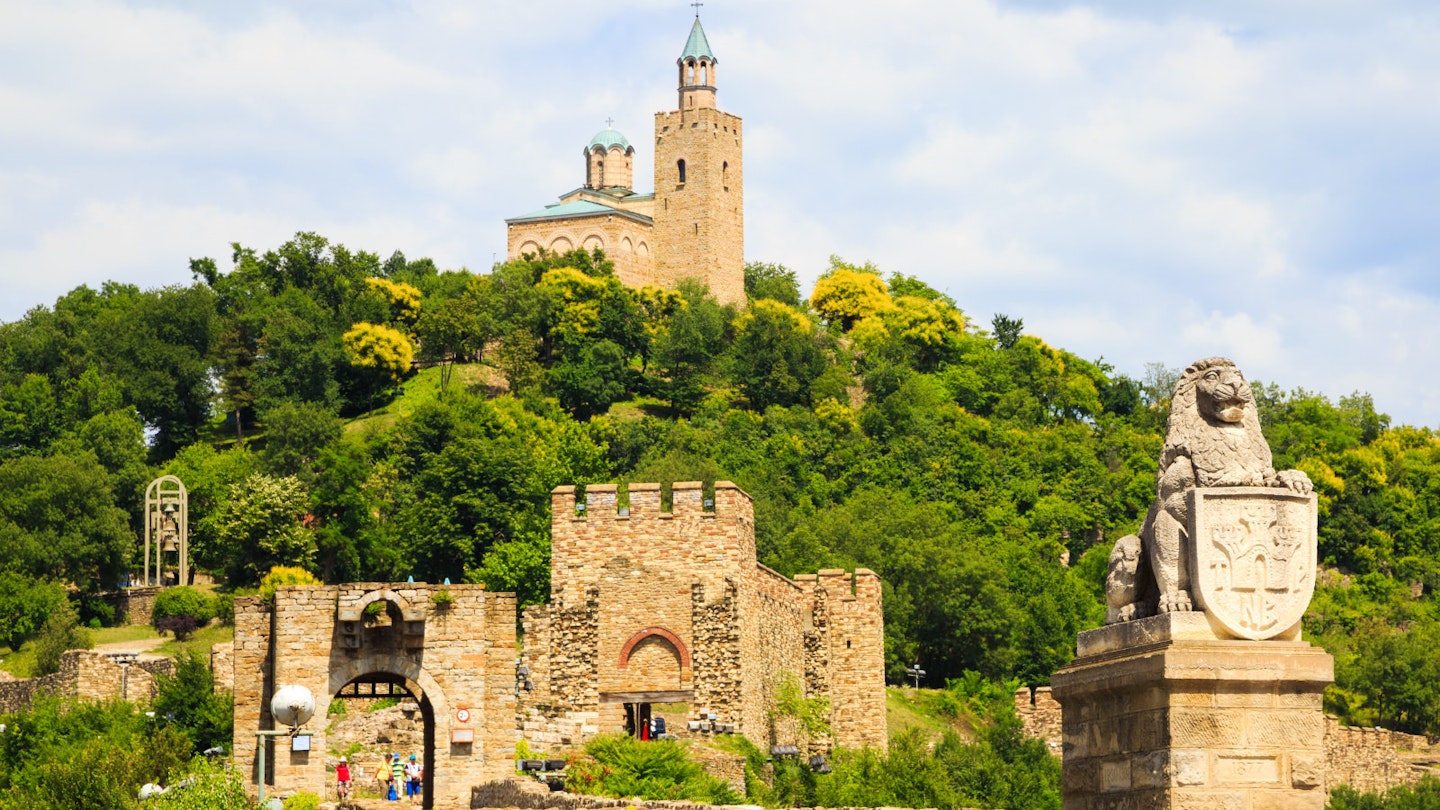Time-travel from medieval battles to chic cocktail bars in one of Bulgaria’s oldest cities. As the country’s former capital, Veliko Târnovo has history echoing from every ivy-strewn eave: its darling old lanes and crumbling citadel exude charisma, but this place knows how to party, too. Here’s how to tackle the town – dramatic Tsarevets Fortress, handicraft shopping, and superb restaurants – in the space of a single weekend.
Day 1
Morning
Looking up at Tsarevets Fortress, it’s easy to imagine Veliko Tarnovo’s medieval glory days. During the 11th and 12th centuries, this was the capital of Bulgaria’s vast empire. The restored fortress crowns the town to this day, and it’s the unmissable starting point for exploring Veliko Tarnovo.
Eighteen churches, a palace, and numerous houses once stood here. A sacking by the Turks in the 14th century reduced the complex to rubble, though a 20th-century makeover has returned much of its grandeur. Tramp along the fortress’ weathered walls, pose with cannons, and peer inside the Cathedral of the Holy Ascension of God, built on the foundations of an early Christian sanctuary.
But the biggest thrill is the view. Veliko Tarnovo is folded into a hairpin bend in the Yantra River and encircled by forested hills, creating a spectacular panorama when viewed from lofty Tsarevets. Once you’ve had your fill of medieval splendour, stagger into nearby Ivan Asen restaurant for satch (a sizzling hot plate piled with meat and veggies).
Afternoon
Walk west on the main road and turn north along ul Mamarchev to reach Veliko Tarnovo’s most enchanting quarter, Samovodska Charshiya. This market square was once crowded with fruit, vegetable, and wool sellers who piled in from surrounding villages. It grew into a crafts centre during the late 19th century, with silversmithery, leatherwork, and ceramics thriving here. These traditional crafts endure: all along ul Rakovski you’ll find butter-soft belts, unique jewellery (try Artissimo Gallery) and eye-popping hair-and-wood masks – still used in spring rites in some Bulgarian villages – at Galeria Manya.
For a late-afternoon pick-me-up, sip a Turkish-style coffee at Shekerdzinitsa, ideally with some rose and pistachio lokum (Turkish delight); just try not to get confectioner’s sugar all over your new hand-stitched scarf. Alternatively, roll straight into dinner at Han Hadji Nikoli, a Bulgarian inn that has been going strong since the mid-19th century.
Evening
Belly full, walk to the western end of ul Rakovski and take the stairs down to the main drag, ul Stambolov and ul Nezavisimost. Though it teems with traffic, this busy artery through town has some excellent drinking haunts. One of the best is Sammy’s Bar (just off ul Nezavisimost), a merry cocktail place with a terrace overlooking the river – it’s an atmospheric spot to raise a glass of rakia (potent fruit brandy). For an even better glimpse over night-time Veliko Tarnovo, keep an eye out for signs to the Skywalk (ul Stambolov) on the way. From this lookout platform, you can lean out for a dizzying view of the valley.
Day 2
Morning
Rakia lingering in your brain cells will soon disperse after a stroll along Veliko Tarnovo’s oldest street. Whitewashed houses, draped in roses and ivy, cluster haphazardly along Ulitsa Gurko. This scenic lane is a cornerstone of local history: in 1877, the street’s namesake General Gurko led a Russian army into town, finally freeing Veliko Tarnovo from Ottoman control.
The street’s most remarkable house (and optical illusion) is Sarafkina Kâshta. At street level, it appears to have two floors, but viewed from the river, its full five floors overhang the water. Within, tread across creaky wooden floors and gaze up at ornate carved ceilings. It’s an enjoyable insight into how Veliko Tarnovo’s well-to-do lived back in the 19th century, listening eagerly for news of the latest Paris fashions and gossiping on the way to church.
Further along ul Gurko, stop for a hearty lunch at Hotel-Mehana Gurko. Snag an outdoor table and you can sit beneath a vine-draped trellis while you tuck into a plate of shopska salad (crisp cucumber and tomato showered in salty cheese) along with succulent grills and stews.
Afternoon
From the inn, follow ul Gurko south before hiking left on ul Asen Ruskov and across the bridge. Throughout your time in Veliko Tarnovo, you won’t fail to have noticed the Asenevtsi Monument rising from a narrow spit of land in the Yantra River. Its central column is a sword pointing heavenward, flanked by members of the Asen dynasty, who bolstered medieval Bulgaria’s status on the world stage and continue to inspire misty-eyed tales of bravery.
Facing the monument is the State Art Museum, also known as the Boris Denev Gallery after a local artist. Denev rose to acclaim through dreamy paintings of rural landscapes, and much of the art in the gallery reflects similar pastoral nostalgia. Afterwards, discover nature beyond the canvas with a walk around Stamboliyski Park, the leafy stretch of land extending east from the gallery.
Evening
Cross the bridge back towards Marno Pole park, ducking north to Shtastliveca 2 (shtastliveca.com) on ul Botev if you’re hungry for reinvented Bulgarian fare. But for Veliko Tarnovo’s edgiest night out, look for the unlabelled door at number 2A on ul Marno Pole. It would be a disservice to call Tam a bar: this is equal parts bar, gallery, language exchange, and raucous late-night hangout.
Alternatively, wander back east towards Tsarevets to witness the Sound & Light Show, which bathes the fortress in scarlet and green to a soundtrack of booming cannons: a fitting finale for 48 hours in this majestic town.





